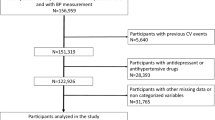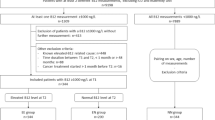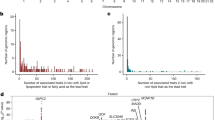Abstract
Background/Objectives:
Epidemiologic findings concerning the association between coffee consumption and prostate cancer risk yielded mixed results. We aimed to investigate the association by performing a meta-analysis of all available studies.
Subjects/Methods:
We searched PubMed, Web of Science and EMBASE for studies published up to July 2013. We calculated the summary relative risk (RR) and 95% confidence intervals (CIs) for ever, moderate and highest consumption of coffee vs non/lowest consumption. The dose–response relationship was assessed by restricted cubic spline model and multivariate random-effect meta-regression.
Results:
A total of 12 case–control studies and 12 cohort studies with 42 179 cases were selected for final meta-analysis. No significant associations were found among overall analysis. A borderline positive association was found for highest drinkers in five small hospital-based case–control (HCC) studies involving 2278 cases. However, compared with non/lowest drinkers, the summary RRs were 0.92 (95% CI=0.85–0.99) for ever drinkers, 0.92 (95% CI=0.85–1.00) for moderate drinkers and 0.83 (95% CI=0.72–0.96) for highest drinkers from 12 cohort studies, comprising a total of 34 424 cases. An increase in coffee intake of two cups/day was associated with a 7% decreased risk of prostate cancer according to cohort studies. A significant inverse relationship was also found for fatal prostate cancers and high-grade prostate cancers.
Conclusions:
Case–control studies especially HCC ones might be prone to selection bias and recall bias that might have contributed to the conflicting results. Therefore, the present meta-analysis suggests a borderline significant inverse association between coffee consumption and prostate cancer risk based on cohort studies.
This is a preview of subscription content, access via your institution
Access options
Subscribe to this journal
Receive 12 print issues and online access
$259.00 per year
only $21.58 per issue
Buy this article
- Purchase on Springer Link
- Instant access to full article PDF
Prices may be subject to local taxes which are calculated during checkout




Similar content being viewed by others
References
Jemal A, Bray F, Center MM, Ferlay J, Ward E, Forman D . Global cancer statistics. CA Cancer J Clin 2011; 61: 69–90.
Siegel R, Naishadham D, Jemal A . Cancer statistics 2013 CA Cancer J Clin 2013; 63: 11–30.
Chen YC, Chiang CI, Lin RS, Pu YS, Lai MK, Sung FC . Diet, vegetarian food and prostate carcinoma among men in Taiwan. Br J Cancer 2005; 93: 1057–1061.
Gallus S, Foschi R, Talamini R, Altieri A, Negri E, Franceschi S et al. Risk factors for prostate cancer in men aged less than 60 years: a case-control study from Italy. Urology 2007; 70: 1121–1126.
Wilson KM, Balter K, Moller E, Adami HO, Andren O, Andersson SO et al. Coffee and risk of prostate cancer incidence and mortality in the Cancer of the Prostate in Sweden Study. Cancer Causes Control 2013; 24: 1575–1581.
Discacciati A, Orsini N, Andersson SO, Andren O, Johansson JE, Mantzoros CS et al. Coffee consumption and risk of localized, advanced and fatal prostate cancer: a population-based prospective study. Ann Oncol 2013; 24: 1912–1918.
Wilson KM, Kasperzyk JL, Rider JR, Kenfield S, van Dam RM, Stampfer MJ et al. Coffee consumption and prostate cancer risk and progression in the Health Professionals Follow-up Study. J Natl Cancer Inst 2011; 103: 876–884.
Park CH, Myung SK, Kim TY, Seo HG, Jeon YJ, Kim Y . Coffee consumption and risk of prostate cancer: a meta-analysis of epidemiological studies. BJU Int 2010; 106: 762–769.
Yu X, Bao Z, Zou J, Dong J . Coffee consumption and risk of cancers: a meta-analysis of cohort studies. BMC Cancer 2011; 11: 96.
Wells G, Shea B, O’Connell D, Robertson J, Peterson J, Welch V et alThe Newcastle-Ottawa Scale (NOS) for assessing the quality of nonrandomised studies in meta-analyses http://www.ohri.ca/programs/clinical_epidemiology/oxford_web.ppt2010.
Sharpe CR, Siemiatycki J . Consumption of non-alcoholic beverages and prostate cancer risk. Eur J Cancer Prev 2002; 11: 497–501.
Slattery ML, West DW . Smoking, alcohol, coffee, tea, caffeine, and theobromine: risk of prostate cancer in Utah (United States). Cancer Causes Control 1993; 4: 559–563.
Higgins JP, Thompson SG . Quantifying heterogeneity in a meta-analysis. Stat Med 2002; 21: 1539–1558.
Hedges LV, Pigott TD . The power of statistical tests in meta-analysis. Psychol Methods 2001; 6: 203–217.
Mantel N, Haenszel W . Statistical aspects of the analysis of data from retrospective studies of disease. J Natl Cancer Inst 1959; 22: 719–748.
DerSimonian R, Laird N . Meta-analysis in clinical trials. Control Clin Trials 1986; 7: 177–188.
Sharp S . sbe23: meta-analysis regression. Stata Technical Bulletin 1998; 42: 16–22.
Egger M, Davey Smith G, Schneider M, Minder C . Bias in meta-analysis detected by a simple, graphical test. BMJ 1997; 315: 629–634.
Orsini N, Li R, Wolk A, Khudyakov P, Spiegelman D . Meta-analysis for linear and nonlinear dose-response relations: examples, an evaluation of approximations, and software. Am J Epidemiol 2012; 175: 66–73.
Harrell Jr FE, Lee KL, Pollock BG . Regression models in clinical studies: determining relationships between predictors and response. J Natl Cancer Inst 1988; 80: 1198–1202.
Jain MG, Hislop GT, Howe GR, Burch JD, Ghadirian P . Alcohol and other beverage use and prostate cancer risk among Canadian men. Int J Cancer 1998; 78: 707–711.
Ellison LF . Tea and other beverage consumption and prostate cancer risk: a Canadian retrospective cohort study. Eur J Cancer Prev 2000; 9: 125–130.
Severson RK, Nomura AM, Grove JS, Stemmermann GN . A prospective study of demographics, diet, and prostate cancer among men of Japanese ancestry in Hawaii. Cancer Res 1989; 49: 1857–1860.
Nilsson LM, Johansson I, Lenner P, Lindahl B, Van Guelpen B . Consumption of filtered and boiled coffee and the risk of incident cancer: a prospective cohort study. Cancer Causes Control 2010; 21: 1533–1544.
Stensvold I, Jacobsen BK . Coffee and cancer: a prospective-study of 43,000 norwegian men and women. Cancer Causes Control 1994; 5: 401–408.
Jacobsen BK, Bjelke E, Kvale G, Heuch I . Coffee drinking, mortality, and cancer incidence: results from a Norwegian prospective study. J Natl Cancer Inst 1986; 76: 823–831.
Le Marchand L, Kolonel LN, Wilkens LR, Myers BC, Hirohata T . Animal fat consumption and prostate cancer: a prospective study in Hawaii. Epidemiology (Cambridge, Mass.) 1994; 5: 276–282.
Hsing AW, McLaughlin JK, Schuman LM, Bjelke E, Gridley G, Wacholder S et al. Diet, tobacco use, and fatal prostate cancer: results from the Lutheran Brotherhood Cohort Study. Cancer Res 1990; 50: 6836–6840.
Li Q, Kakizaki M, Sugawara Y, Tomata Y, Watanabe T, Nishino Y et al. Coffee consumption and the risk of prostate cancer: the Ohsaki Cohort Study. Br J Cancer 2013; 108: 2381–2389.
Shafique K, McLoone P, Qureshi K, Leung H, Hart C, Morrison DS . Coffee consumption and prostate cancer risk: further evidence for inverse relationship. Nutr J 2012; 11: 42.
Bosire C, Stampfer MJ, Subar AF, Wilson KM, Park Y, Sinha R . Coffee consumption and the risk of overall and fatal prostate cancer in the NIH-AARP Diet and Health Study. Cancer Causes Control 2013; 24: 1527–1534.
Polesel J, Zucchetto A, Talamini R, Dal Maso L, Serraino D, La Vecchia C et al. Re: coffee consumption and prostate cancer risk and progression in the health professional follow-up study. J Natl Cancer Inst 2012; 104: 1684–1686.
Gronberg H, Damber L, Damber JE . Total food consumption and body mass index in relation to prostate cancer risk: a case-control study in Sweden with prospectively collected exposure data. J Urol 1996; 155: 969–974.
Villeneuve PJ, Johnson KC, Kreiger N, Mao Y . Risk factors for prostate cancer: results from the Canadian National Enhanced Cancer Surveillance System. The Canadian Cancer Registries Epidemiology Research Group. Cancer Causes Control 1999; 10: 355–367.
Hsieh CC, Thanos A, Mitropoulos D, Deliveliotis C, Mantzoros CS, Trichopoulos D . Risk factors for prostate cancer: a case-control study in Greece. Int J Cancer 1999; 80: 699–703.
Ganesh B, Saoba SL, Sarade MN, Pinjari SV . Risk factors for prostate cancer: an hospital-based case-control study from Mumbai, India. Indian J Urol 2011; 27: 345–350.
Deneo-Pellegrini H, Ronco AL, De Stefani E, Boffetta P, Correa P, Mendilaharsu M et al. Food groups and risk of prostate cancer: a case-control study in Uruguay. Cancer Causes Control 2012; 23: 1031–1038.
Geybels MS, Neuhouser ML, Stanford JL . Associations of tea and coffee consumption with prostate cancer risk. Cancer Causes Control 2013; 24: 941–948.
Geybels MS, Neuhouser ML, Wright JL, Stott-Miller M, Stanford JL . Coffee and tea consumption in relation to prostate cancer prognosis. Cancer Causes Control 2013; 24: 1947–1954.
Mariot P, Prevarskaya N, Roudbaraki MM, Le Bourhis X, Van Coppenolle F, Vanoverberghe K et al. Evidence of functional ryanodine receptor involved in apoptosis of prostate cancer (LNCaP) cells. Prostate 2000; 43: 205–214.
Russnes KM, Wilson KM, Epstein MM, Kasperzyk JL, Stampfer MJ, Kenfield SA et al. Total antioxidant intake in relation to prostate cancer incidence in the health professionals follow up study. Int J Cancer 2013, e-pub ahead of print 19 August 2013; doi:10.1002/ijc.28438.
Svartberg J, Midtby M, Bonaa KH, Sundsfjord J, Joakimsen RM, Jorde R . The associations of age, lifestyle factors and chronic disease with testosterone in men: the Tromso Study. Eur J Endocrinol 2003; 149: 145–152.
Severi G, Morris HA, MacInnis RJ, English DR, Tilley W, Hopper JL et al. Circulating steroid hormones and the risk of prostate cancer. Cancer Epidemiol Biomarkers Prev 2006; 15: 86–91.
Wiren S, Stocks T, Rinaldi S, Hallmans G, Bergh A, Stenman UH et al. Androgens and prostate cancer risk: a prospective study. Prostate 2007; 67: 1230–1237.
Gann PH, Hennekens CH, Ma J, Longcope C, Stampfer MJ . Prospective study of sex hormone levels and risk of prostate cancer. J Natl Cancer Inst 1996; 88: 1118–1126.
Imatoh T, Tanihara S, Miyazaki M, Momose Y, Uryu Y, Une H . Coffee consumption but not green tea consumption is associated with adiponectin levels in Japanese males. Eur J Nutr 2011; 50: 279–284.
Nishimura K, Soda T, Nakazawa S, Yamanaka K, Hirai T, Kishikawa H et al. Serum adiponectin and leptin levels are useful markers for prostate cancer screening after adjustments for age, obesity-related factors, and prostate volume. Minerva UrolNefrol 2012; 64: 199–208.
Mistry T, Digby JE, Desai KM, Randeva HS . Leptin and adiponectin interact in the regulation of prostate cancer cell growth via modulation of p53 and bcl-2 expression. BJU Int 2008; 101: 1317–1322.
Kanazawa I, Yamaguchi T, Sugimoto T . Serum insulin-like growth factor-I is negatively associated with serum adiponectin in type 2 diabetes mellitus. Growth Horm IGF Res 2011; 21: 268–271.
Rowlands MA, Gunnell D, Harris R, Vatten LJ, Holly JM, Martin RM . Circulating insulin-like growth factor peptides and prostate cancer risk: a systematic review and meta-analysis. Int J Cancer 2009; 124: 2416–2429.
Author information
Authors and Affiliations
Corresponding author
Ethics declarations
Competing interests
The authors declare no conflict of interest.
Additional information
Supplementary Information accompanies this paper on European Journal of Clinical Nutrition website
Supplementary information
Rights and permissions
About this article
Cite this article
Zhong, S., Chen, W., Yu, X. et al. Coffee consumption and risk of prostate cancer: an up-to-date meta-analysis. Eur J Clin Nutr 68, 330–337 (2014). https://doi.org/10.1038/ejcn.2013.256
Received:
Revised:
Accepted:
Published:
Issue Date:
DOI: https://doi.org/10.1038/ejcn.2013.256



